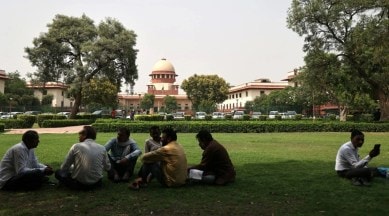Stay updated with the latest - Click here to follow us on Instagram
Clarify if IPS officer’s concurrence is needed to empanel him for DGP appointment, SC tells MHA
IPS officer Sunil Achaya, who hails from the Nagaland cadre and is currently on central deputation, had expressed unwillingness to return to the state due to which his name could not be empanelled by the UPSC in the list of officers to be considered for the DGP post.

The Supreme Court on Monday asked the Union Ministry of Home Affairs (MHA) to clarify in one week’s time whether the concurrence of an IPS officer who may be on central deputation is necessary before empanelling him/her for appointment as DGP of the state whose cadre they belong to.
A bench of Chief Justice D Y Chandrachud and Justice P S Narasimha also asked the ministry to produce the specific rule, if it is of the view that such concurrence is required.
The direction came after the court was told that senior IPS officer Sunil Achaya, who hails from the Nagaland cadre and is currently on central deputation, had expressed his unwillingness to go back to the state due to which his name could not be empanelled by the Union Public Service Commission (UPSC) in the list of officers to be considered for the DGP post.
Nagaland said that in terms of the rules, while the consent of the officer is required to be taken for an overseas posting, no such consent is necessary for a posting within the country and there is no reason why the name of the officer should not be empanelled by the UPSC.
Taking note, the apex court also asked the ministry to clarify whether Achaya’s services “are required for any reasons of national interest on central deputation or whether he can be placed on the panel particularly in view of the fact that sufficient number of eligible officers is not available for being empanelled for Nagaland”.
Meanwhile, the UPSC also told the court that on November 15, 2022, it had addressed a communication to the secretary, Ministry of Home Affairs (MHA), suggesting that UPSC should be empowered to relax the eligibility criteria from 30 years of service to 25 years for the states of Himachal Pradesh, Manipur, Nagaland, Uttarakhand, Tripura and Sikkim, in case a sufficient number of eligible officers is not available to form a panel of three officers. The Commission added that the MHA had concurred with the proposal.
Following the submission, the Supreme Court also asked the MHA to place on record the communication by which it had concurred with the UPSC proposal for relaxing the eligibility criteria from 30 years to 25 years in the case of Nagaland.
The court was hearing a plea by the Nagaland Students Union against the extension that was given to former DGP T John Longkumer who was to superannuate on August 31, 2022. The plea pointed out that the officer had participated in the proceedings of the Police Establishment Board of Nagaland conducted on February 4, 2022, for the empanelment of officers for the DGP post.
Following the Supreme Court’s intervention, the UPSC sent a panel on December 15, 2022 to the state. However, since Achaya had expressed his unwillingness and there was no other eligible officer available, only the name of Rupin Sharma was considered and the state notified his appointment as DGP earlier this month.